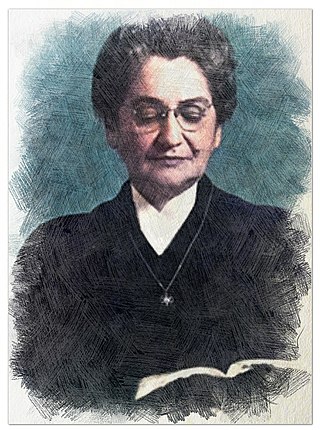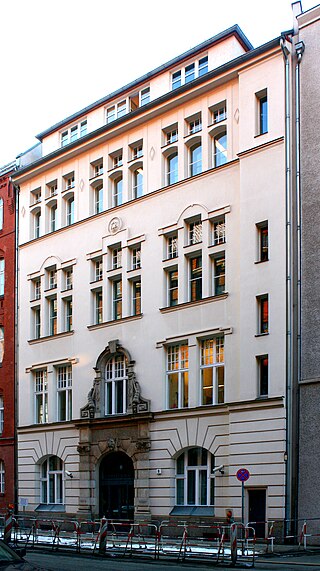Related Research Articles

The Jewish Theological Seminary (JTS) is a Conservative Jewish education organization in New York City, New York. It is one of the academic and spiritual centers of Conservative Judaism and a center for academic scholarship in Jewish studies. The Jewish Theological Seminary Library is one of the most significant collections of Judaica in the world.
Sherwin Theodore Wine was an American rabbi and a founding figure of Humanistic Judaism, a movement that emphasizes Jewish culture and history as sources of Jewish identity rather than belief in any gods. He was originally ordained as a Reform rabbi but later founded the Birmingham Temple, the first congregation of Humanistic Judaism, in 1963.

The Hebrew Union College – Jewish Institute of Religion is a Jewish seminary with three locations in the United States and one location in Jerusalem. It is the oldest extant Jewish seminary in the Americas and the main seminary for training rabbis, cantors, educators and communal workers in Reform Judaism. HUC-JIR has campuses in Cincinnati, Ohio, New York City, Los Angeles, and Jerusalem. The Jerusalem campus is the only seminary in Israel for training Reform Jewish clergy.
Sally Jane Priesand is America's first female rabbi ordained by a rabbinical seminary, and the second formally ordained female rabbi in Jewish history, after Regina Jonas. Priesand was ordained by the Hebrew Union College-Jewish Institute of Religion on June 3, 1972, at the Plum Street Temple in Cincinnati. After her ordination she served first as assistant and then as associate rabbi at Stephen Wise Free Synagogue in New York City, and later led Monmouth Reform Temple in Tinton Falls, New Jersey from 1981 until her retirement in 2006. She is featured in numerous books including Rabbis: The Many Faces of Judaism and Fifty Jewish Women who Changed the World.

Paula Ackerman is thought to have been the first woman to perform rabbinical functions in the United States, leading the Beth Israel congregation in Meridian, Mississippi, from 1951 to 1953—making her the first woman to assume spiritual leadership of a mainstream American Jewish congregation—and the Temple Beth-El in Pensacola, Florida, briefly in the 1960s. She led the National Committee on Religious Schools for the National Federation of Temple Sisterhoods.

Deborah Lynn Friedman was an American singer-songwriter of religious Jewish music. She was an early pioneer of gender-sensitive language: using the feminine forms of the Divine or altering masculine-only text references in the Jewish Liturgy to include feminine language.
Amy Eilberg is the first female rabbi ordained in Conservative Judaism. She was ordained in 1985 by the Jewish Theological Seminary of America, one of the academic centers and spiritual centers of Conservative Judaism.
Jewish feminism is a movement that seeks to make the religious, legal, and social status of Jewish women equal to that of Jewish men in Judaism. Feminist movements, with varying approaches and successes, have opened up within all major branches of the Jewish religion.

Hochschule für die Wissenschaft des Judentums, or Higher Institute for Jewish Studies, was a rabbinical seminary established in Berlin in 1872 and closed down by the Nazi government of Germany in 1942. Upon the order of the government, the name was officially changed to Lehranstalt für die Wissenschaft des Judentums.
Rabbi David Eli Stern is the senior rabbi at Temple Emanu-El of Dallas, the largest synagogue in the South/Southwest United States and the third-largest in the Union for Reform Judaism. He was selected as the 26th most influential rabbi in America by Newsweek magazine in 2008 and the 30th most influential in 2009.

Levi Arthur Olan was an American Reform Jewish rabbi, liberal social activist, author, and professor. Born in Ukraine in 1903, he grew up in Rochester, New York and was ordained at Hebrew Union College in 1929. He served as rabbi of Temple Emanuel in Worcester, Massachusetts from 1929 to 1948, and Temple Emanu-El in Dallas, Texas from 1948 to his retirement in 1970. Olan was one of the most prominent liberal voices in Dallas, which was a predominantly conservative city. His views on poverty, war, civil rights, civil liberties and other topics were disseminated largely through his popular program on WFAA radio, and earned him the moniker, “the conscience of Dallas.” He also had a longstanding visiting professorship at Southern Methodist University and published numerous works on Judaism, process theology, and contemporary social issues.
Women rabbis and Torah scholars are Jewish women who have received formal semikhah as rabbis or are recognized for their studies and contributions to Jewish religious tradition, respectively. The ordination of women in Judaism has grown since the 1970s, with thousands of Jewish women having received formal ordination since then. The majority of them have been associated with progressive Jewish religious movements, including Reform Judaism, Conservative Judaism, Liberal Judaism, Reconstructionist Judaism, and Jewish Renewal. In Orthodox Judaism, the issue of women's ordination is complex and has not reached a consensus. Although a large and growing number of Orthodox women have received rabbinic ordination, many major Orthodox communities and institutions reject women's credentials if not ordination. As an alternative approach, some Orthodox Jewish institutions train women for various formal Jewish religious leadership roles, including entail training in Halakha, but no formal rabbinic ordination is granted. Instead, women receive alternative titles. These women, even with their alternative titles, are often perceived as equivalent to traditionally ordained rabbis.

Temple Israel is a Reform Jewish congregation and synagogue, located at 130 Riverside Drive in Dayton, Ohio, in the United States.
Barbara Jean Ostfeld, formerly known as Barbara Ostfeld-Horowitz, is the first ordained female cantor in Jewish history, and an American feminist, mental health advocate, and author.

Gail Ilene Posner Karp served as the cantor of the Reform Jewish synagogue Temple Emanuel in Davenport, Iowa from 1987 - 2016. She is also employed by the Department of Defense.

Sergio Bergman is an Argentine rabbi, politician, pharmacist, writer, and social activist. In 2015, he was appointed as Minister in Mauricio Macri's cabinet, in the newly elevated Ministry of the Environment and Sustainable Development. In 2018, the Ministry was demoted back to Government Secretariat, and Bergman remained in charge as Secretary of the Environment, a position he held until 2019.
Merle Feld is an educator, activist, author, playwright, and poet.

A Mi Shebeirach is a Jewish prayer used to request a blessing from God. Dating to the 10th or 11th century CE, Mi Shebeirach prayers are used for a wide variety of purposes. Originally in Hebrew but sometimes recited in the vernacular, different versions at different times have been among the prayers most popular with congregants. In contemporary Judaism, a Mi Shebeirach serves as the main prayer of healing, particularly among liberal Jews, to whose rituals it has become central.
LGBTQ synagogues are synagogues primarily serving LGBTQ Jews. LGBTQ synagogues date to 1970, with the oldest extant one, Beth Chayim Chadashim (BCC) in Los Angeles, established in 1972. Their religious doctrines vary, but are generally liberal; many affiliate with the Reform movement and one with Reconstructionism, while others, such as Congregation Beit Simchat Torah (CBST) in New York City, are independent. Many use custom liturgy shaped by the LGBTQ experience and Jewish feminism, often using degenderized terms to refer to God. LGBTQ synagogues are largely found in the United States, although one, Beit Klal Yisrael, exists in London.
References
- ↑ "Debbie Friedman's Healing Prayer". Forward.com. January 19, 2011.
- ↑ Umansky, Ellen; Borowitz, Eugene, Ed. (1995). Choices In Modern Jewish Thought: A Partisan Guide (Second ed.). Springfield, NJ: Behrman House. pp. 332–334.
{{cite book}}: CS1 maint: multiple names: authors list (link) - ↑ "Our Rabbi". Temple Emanuel - Rochester. May 2, 2012. Retrieved January 14, 2024.
- ↑ Himmelston, Drew (June 26, 2019). "The Untold Story of Ameinu". Tablet Magazine. Retrieved January 14, 2023.
- ↑ "Our Rabbi". Temple Emanuel - Rochester. May 2, 2012. Retrieved January 14, 2024.
- ↑ "People Talk: A reform rabbi, Setel will fight for what she believes in – City & Region – the Buffalo News". Archived from the original on December 6, 2014. Retrieved April 13, 2015.